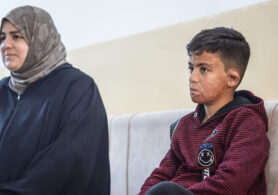The Intimacies of Remote Warfare programme, together with its civil society partners, puts forward their second round of 16 recommendations to the Netherlands Ministry of Defence to further improve Dutch policy and practice in monitoring, reporting on, and response to civilian harm caused by its military operations. The recommendations are the result of 4 years of engagement between our civil society consortium – consisting of Airwars, Center for Civilians in Conflict, PAX, and Utrecht University – and the Dutch Ministry of Defence on this topic, also known as the Transparency Road Map process. They are primarily intended for the Netherlands MoD, which is expected to put forward its own advice for policy initiatives to the Minister of Defence later this year, but should also encourage other Western states to follow suit.
From the Intimacies of Remote Warfare perspective, the most pressing recommendation are that the MoD should:
1) Broaden its understanding of civilian harm beyond just civilian casualties.
2) Inform the Parliament about the risks to civilian harm in all its military contributions, not just those covered by Article 100 letters.
3) Formalise how it monitors and investigates allegations of civilian harm, through the creation of a civilian harm tracking cell. The cell should have a clear methodology and data management system to ensure allegations of harm are not processed in an ad-hoc manner as one-off incidents, but are examined thoroughly with a rigorous approach across military missions and operations.
Only then can the MoD itself understand the true impact of its military actions on civilian harm and subsequently ensure accountability to those affected, draw lessons learned for a stronger mitigation approach in future operations, and adequately inform Parliament and the public so we can have a more honest conversation about the cost of our wars.
Read the full list of the Roadmap Recommendations hereunder. They include an overview of our process to date, a summary page on our recommendations, and finally the full recommendations with examples of best practice. While they were developed for the Dutch MoD, many of these reflect years of research and advocacy across national contexts and will apply to many of the Netherlands’ allies as well.
(Remote) Warfare and Civilian Harm
As we are confronted on a daily basis with horrifying realities of the impact of remote and urban warfare on civilian harm around the world, it is important to ask ourselves: What wars are fought in our name? By our governments and militaries? What strategies and technologies do they use? Do we know what impact they have on civilian harm? And how are our governments held to account for the harm done?
The Intimacies of Remote Warfare has conducted years of research on exactly these questions and found that in fact Western Ministries of Defence (MoD) are not well equipped themselves to conduct investigations on civilian harm and often deny civilian harm allegations put forward by civil society. Consequently, Western publics and parliaments are very badly informed about the true impact of Western military interventions. We conclude that this leaves a large gap between rhetoric and reality when it comes to the prevention, protection and response to civilian harm in Western military operations as well as our Parliaments ability to exert democratic control over the violence that is executed in our name.
Therefore, the Intimacies of Remote Warfare set out to improve the lack of transparency and accountability for civilian harm in the military domain in the Netherlands. The pressing need for this type of impact arose in 2020, shortly after the news broke that the Netherlands was responsible for two 2015 airstrikes on Mosul and Hawija,Iraq, that caused respectively 4 and at least 85 civilian casualties and resulted in widespread material damages and other (long-term) negative impacts. In both cases, it took the Netherlands over four years to acknowledge responsibility, which indicated significant shortcomings regarding transparency and accountability. As a result, the then-Minister of Defense ordered a review of the MoD’s civilian harm policies and practices, which also marked the start of our engagement under the ‘Roadmap Process’.
Roadmap Process and Milestones
This process entailed a series of exchanges between the MoD and our civil society consortium – with expertise in monitoring and transparency, accountability, legality and legitimacy. The first phase concluded in 2021, when our consortium published a first set of recommendations. Subsequently in 2022, outgoing Minister of Defence Ollongren announced the ‘10-step policy plan’ to improve Dutch practices around preventing, minimising and responding to civilian harm caused by Dutch military operations. This represented a crucial step in the right direction. So far, it has led to the creation of an MoD-internal PoC task force, the Parliament has been informed about potential civilian harm risks related to two new Dutch military deployments through Article 100 letters, and 2023 media reporting on another likely Dutch civilian harm event in Mosul in 2016, triggered the MoD’s new transparency and investigation procedures.
Road Map Process 2.0 and New Recommendations
As the MoD looked to implement its 10-step policy plan, it again sought the advice of our organisation. The second phase of our exchanges under the Roadmap process have focused on areas where we see a continued need for improvement and led us to formulate 16 new recommendations. We hope the MoD will swiftly translate into corresponding policy changes.



